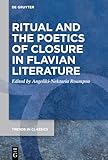Ritual and the Poetics of Closure in Flavian Literature / ed. by Angeliki-Nektaria Roumpou.
Material type: TextSeries: Trends in Classics - Supplementary Volumes ; 147Publisher: Berlin ; Boston : De Gruyter, [2023]Copyright date: ©2023Description: 1 online resource (VIII, 252 p.)Content type:
TextSeries: Trends in Classics - Supplementary Volumes ; 147Publisher: Berlin ; Boston : De Gruyter, [2023]Copyright date: ©2023Description: 1 online resource (VIII, 252 p.)Content type: - 9783110770469
- 9783110770568
- 9783110770483
- 870.9382038 23/eng/20230905
- PA6029.R4 R58 2023
- online - DeGruyter
- Issued also in print.
| Item type | Current library | Call number | URL | Status | Notes | Barcode | |
|---|---|---|---|---|---|---|---|
 eBook
eBook
|
Biblioteca "Angelicum" Pont. Univ. S.Tommaso d'Aquino Nuvola online | online - DeGruyter (Browse shelf(Opens below)) | Online access | Not for loan (Accesso limitato) | Accesso per gli utenti autorizzati / Access for authorized users | (dgr)9783110770483 |
Browsing Biblioteca "Angelicum" Pont. Univ. S.Tommaso d'Aquino shelves, Shelving location: Nuvola online Close shelf browser (Hides shelf browser)
Frontmatter -- Acknowledgements -- Contents -- Introduction: Ritual and the Poetics of Closure in Flavian Literature -- Ritual Closure and Transcendence: Mobilising Ritual Theory for Flavian Epic -- Religious and Social Rituals as Motifs of Closure in Martial’s Epigrams -- Closural Poetics in Martial, Epigrams 10 -- Ritual and the Impossibility of Song in Statius’ Siluae 5 -- Sacrifice, Death, and Closure in Valerius’ Argonautica Book 1 -- Mansuri Compos Decoris? Scipio’s Reditus and Exile in Punica 17 -- Silius Italicus’ False Rituals, Politics and Poetics: Mock Funerals and Triumphs as Closural Markers in the Punica -- Burning up, Melting down, Collapsing in: Fire Imagery, Narrative Articulation, Funerals, and the Incestuous Poetics of Statius’ Thebaid -- Narrative and Psychological Closure through Ritual at Cyzicus and Circe’s Island -- Compage soluta: Collapsing Universe and the Boundaries of Epic Poetry (Lucan, Silius, Statius and Claudian’s De raptu) -- Epilogue -- List of Contributors -- Bibliography -- Thematic Index -- Index of Sources
restricted access online access with authorization star
http://purl.org/coar/access_right/c_16ec
This collection of papers responds to the question of whether a ritual at the end of a text can offer resolution and order or rather a complicated kind of closure. It reveals that ritual can bring but also can thwart closure by alluding to new beginnings. A ritual could be a perfect kind of ending but it hardly ever seems to be. In Flavian literature this is even more apparent because of the complicated political background under which these texts were produced. Ancient religious practices in the closing sections of Flavian texts help us create connections between endings and (new) beginnings, order and disorder, binding and loosening, structure and dissolution which reflects the structure of the Empire in Flavian Rome. Overall, this volume offers a new tool for studying literary endings through ritual, which promotes our understanding of Flavian culture and politics as well as creating a new perception of the use of religion and ritual in Flavian literature: instead of giving a sense of closure, this volume argues that ritual is a medium to increase complexity, to expose ritual actors and to project a generic riskiness of ritual actors also onto the epic actors who are acting before and mostly after a ritual scene.
Issued also in print.
Mode of access: Internet via World Wide Web.
In English.
Description based on online resource; title from PDF title page (publisher's Web site, viewed 06. Mrz 2024)









